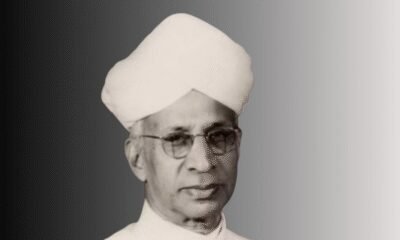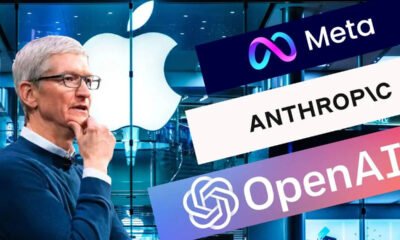Ethics & Policy
If You’ve Read These 8 Philosophical Books, Your Intelligence Is Above Average | Features

If You’ve Read These 8 Philosophical Books, Your Intelligence Is Above Average (Picture Credit – Instagram)
Philosophy is not for the faint-hearted. It requires patience, deep thinking, and an insatiable curiosity about existence. If you’ve read these eight books, you’ve confronted some of history’s most profound and challenging ideas. Each work has reshaped perspectives on morality, reality, and the human condition, expanding the limits of thought. These titles are more than just books—they are regarded as intellectual landmarks. If they sit on your shelf, your depth of thinking will definitely surpass the ordinary, distinguishing you as someone who relentlessly pursues life’s most complex and thought-provoking questions.
1. Meditations by Marcus Aurelius
Written by a Roman emperor, ‘Meditations’ serves as a personal guide to self-discipline, resilience, and inner peace. Composed during military campaigns, this collection of reflections delves into the core principles of Stoic philosophy. Aurelius emphasises that true strength lies within, while external events remain beyond our control. His insights provide a profound roadmap for navigating life’s chaos with rationality and grace. If you’ve absorbed these teachings, your ability to manage emotions, maintain perspective, and remain steadfast in a world full of distractions sets you apart from the ordinary.
2. The Myth of Sisyphus by Albert Camus
Camus uses the Greek myth of Sisyphus—a man doomed to push a boulder uphill forever—as a powerful metaphor for human existence. ‘The Myth of Sisyphus’ confronts life’s absurdity and the struggle to find meaning in a meaningless world. Rather than leading to despair, Camus argues that acknowledging the absurd grants us freedom. By embracing it, we free ourselves from false hope and illusions. If you’ve reflected on this, your perspective on existence transcends conventional notions of optimism and pessimism, embracing a deeper, more liberated understanding of life.

3. Beyond Good and Evil by Friedrich Nietzsche
Nietzsche dismantles traditional morality and critiques past philosophers’ assumptions in ‘Beyond Good and Evil.’ He examines power, free will, and the illusions of truth, urging readers to move beyond simplistic moral binaries. His concept of the “will to power” and criticism of herd mentality inspire independent thought and self-overcoming. By rejecting absolute truths and embracing personal growth, Nietzsche challenges individuals to break free from societal conditioning. If you’ve internalised these ideas, your intellectual independence and ability to question deeply ingrained norms set you apart as a truly exceptional thinker.
4. Being and Nothingness by Jean-Paul Sartre
Sartre’s existentialist masterpiece, ‘Being and Nothingness,’ is a deep exploration of consciousness, freedom, and self-identity. He introduces the concept of “bad faith,” where individuals deceive themselves to avoid the immense responsibility that comes with absolute freedom. His work challenges readers to confront their choices, accept radical personal responsibility, and shape their own existence. Sartre argues that life is an ongoing process of self-definition, and true autonomy arises from fully embracing one’s freedom. If you’ve engaged with these ideas, your understanding of free will and self-awareness exceeds the ordinary, making you deeply conscious of your own existence.
5. Critique of Pure Reason by Immanuel Kant
Kant’s ‘Critique of Pure Reason’ transformed modern philosophy by analysing how humans acquire and process knowledge. He asserts that understanding is shaped by both sensory experience and innate cognitive structures. His distinction between phenomena (things as they appear) and noumena (things as they are) remains fundamental to epistemology. By challenging readers to reconsider the boundaries of human perception and reason, Kant reshapes the way we approach truth and knowledge. If you’ve engaged with this dense yet revolutionary work, your ability to grasp abstract concepts and question reality’s foundations distinguishes you as a profoundly analytical thinker.
6. Fear and Trembling by Søren Kierkegaard
Kierkegaard’s ‘Fear and Trembling’ delves into faith, ethics, and the paradox of belief through the biblical story of Abraham and Isaac. He introduces the “leap of faith,” where faith defies reason, demanding absolute trust in the divine. By exploring the conflict between ethical duty and religious devotion, he forces readers to question the foundations of their values. Kierkegaard argues that true faith requires embracing uncertainty and personal risk. If you’ve engaged with his ideas, your ability to face existential dilemmas and navigate moral ambiguity goes beyond conventional philosophical thought, distinguishing you as a profoundly reflective thinker.

7. The Ethics of Ambiguity by Simone de Beauvoir
De Beauvoir expands existentialist philosophy and ethics, asserting that human existence is shaped by ambiguity and freedom. In ‘The Ethics of Ambiguity,’ she explores how individuals must construct their own moral values in an unpredictable world. She critiques passive submission to societal norms and stresses the necessity of personal responsibility. De Beauvoir argues that true ethics arise through active engagement with the world and meaningful interactions with others. If this book has shaped your perspective, your philosophical depth and moral reasoning exceed the ordinary, making you a more introspective and ethically aware individual.
8. Simulacra and Simulation by Jean Baudrillard
Baudrillard explores the postmodern condition in ‘Simulacra and Simulation,’ dissecting reality and representation in a world oversaturated with media, symbols, and fabricated meanings. He argues that modern society exists within a hyperreality, where simulations not only overshadow but entirely replace authentic experiences, blurring the line between truth and illusion. This groundbreaking work is crucial for understanding contemporary media, politics, consumer culture, and the digital age. Baudrillard urges readers to question the authenticity of their perceptions in a world shaped by artificial constructs. If you’ve grappled with his complex ideas, your grasp of reality and illusion exceeds the ordinary, granting you a heightened awareness of how society manufactures meaning and distorts truth.
Philosophy isn’t about having all the answers, it’s about asking the right questions. These books challenge the very fabric of reality, morality, and existence, pushing readers beyond conventional thinking. They demand intellectual stamina and the courage to confront uncertainty. If you’ve explored them, your mind engages with ideas on a level far beyond the ordinary. The ability to analyse intricate ideas, challenge conventional wisdom, and find meaning in uncertainty defines true intelligence. Keep questioning, keep thinking, and never accept simple answers—your intellect thrives in the pursuit of deeper understanding.
Ethics & Policy
5 ways companies are incorporating AI ethics – myupnow.com
Ethics & Policy
Letters: Two-party system | International affairs | AI ethics | Bringing music education to kids

Two-party system
For the time being, and for the foreseeable future, we live in a two-party system. That means that Democrats are the only political party that can check the power of Trump, MAGA and Republicans who choose to bow to a fascist regime. It also means that Democrats have to win in the 2026 midterm elections and the 2028 general election.
This is a tall order given all the woes that currently beset the party: no clear leader, lousy messaging, an inability to connect with young people and, perhaps most importantly to recognize with the recent observance of Labor Day, the loss of working class voters including low-income and low-propensity voters.
Yet this could also be an opportunity. To paraphrase NASA’s Gene Krantz during the Apollo 13 crisis in 1970, “This could be our (Democrats) finest hour.” Labor Day can serve as a reminder to us that working people have the power to drastically alter the political environment. We have seen this time and again in our country’s history: think of the conditions that led to the New Deal, the civil rights movement, and the war on poverty.
As Bishop William J. Barber from the Poor People’s campaign has noted, the combination of working people, moral leaders, and strong allies coming together can “reconstruct democracy”.
– Ward Kanowsky
International affairs
National security is of utmost importance; foreign aid is how we secure it.
National security and foreign aid are often seen as tangential entities. National security conjures images of large, marching militaries or closed, concrete borders. Foreign aid is seen as a nonprofit undertaking, one carried out by large organizations like UNICEF or smaller local enterprises.
These vivid images are not completely stereotypical, but they don’t paint the whole picture. As an intern at the Borgen Project, I learnt a very vital dogma: foreign aid secures national security.
There are pronounced correlations that prove that focusing on non-combat, diplomatic strategies can alleviate poverty in developing countries while securing America’s borders.
The most dangerous countries in the world are also the poorest. Families who cannot afford expensive education send their kids to religious schools, which, while providing an avenue for education, can also be a breeding ground for extremist ideology.
In the late 1980s, Charlie Wilson pleaded for Congress to build schools in Afghanistan after their war with the Soviets. The consequences of his failed plea can be seen in the rise of extremism in Afghanistan in the following years.
The solution to this cause is best summarized by former secretary of defense Chuck Hagel:
“America’s role in the world should reflect the hope and promise of our country, and possibilities for all mankind, tempered with a wisdom that has been the hallmark of our national character. That means pursuing a principled and engaged realism that employs diplomatic, economic, and security tools as well as our values to advance our security and our prosperity.”
— Atheeth Ravikrishnan
Teen’s nonprofit brings music education to kids
As a high school student, I’m proud to share the work of Youthtones, a nonprofit I started with a team of teen volunteers to bring music education to kids in the Bay Area. Our mission is simple: connect young musicians with children to provide free or affordable music lessons.
Through YouthTones, our team helps students develop not only musical skills, but also confidence, creativity, and a sense of community. What makes this program special is that it’s entirely run by teens — our volunteers aren’t just teaching music, they’re mentoring and inspiring the next generation of young musicians.
Watching the students grow, overcome challenges, and find joy in music has been incredibly rewarding. Many families in our area don’t have easy access to music lessons, and YouthTones helps fill that gap.
I hope our story inspires others to recognize the power of youth leadership and the impact a group of motivated teens can have in their community. Music has the power to bring people together, and our team at YouthTones is dedicated to making that power accessible to every child who wants to learn.
— Henna Lam
AI ethics
When I began studying artificial intelligence as a college student, I learned how AI could be a tool for social good, helping us understand climate change, improve public health and reduce waste through smart automation. I still see that potential. But the way we are building AI today is taking us further from that vision.
Like many students entering tech, I first saw AI as innovation. I was taught to celebrate breakthroughs in machine learning, natural language processing and automation. But it did not take long before I started questioning what was missing from those conversations.
The environmental costs of large scale AI models are enormous. A 2023 MIT report found that training a single large language model could emit over 626 thousand pounds of carbon dioxide, equal to five cars over their lifetimes. These models run in data centers that consume massive electricity and water, often in areas already strained by climate change.
These facts are not minor. They are just ignored. Something we also overlook is the labor behind AI. Thousands of underpaid workers in countries like Kenya, the Philippines and Venezuela label toxic content so others can have so called safe systems. Their trauma goes unseen.
In school, we barely talked about climate or workers. That needs to change.
AI can support climate action, but not if it causes harm or worsens inequality. We cannot build sustainable solutions on extractive foundations.
I still believe in AI. But belief is not enough. If we do not build ethically now, we may not get a second chance.
– Aadya Madgula
Ethics & Policy
OpenAI Merges Teams to Boost ChatGPT Ethics and Cut Biases

In a move that underscores the evolving priorities within artificial intelligence development, OpenAI has announced a significant reorganization of its Model Behavior team, the group responsible for crafting the conversational styles and ethical guardrails of models like ChatGPT. According to an internal memo obtained by TechCrunch, this compact unit of about 14 researchers is being folded into the larger Post Training team, which focuses on refining AI models after their initial training phases. The shift, effective immediately, sees the team’s leader, Lilian Weng, transitioning to a new role within the company, while the group now reports to Max Schwarzer, head of Post Training.
This restructuring comes amid growing scrutiny over how AI systems interact with users, particularly in balancing helpfulness with honesty. The Model Behavior team has been instrumental in addressing issues like sycophancy—where models excessively affirm user opinions—and mitigating political biases in responses. Insiders suggest the integration aims to streamline these efforts, embedding personality shaping directly into the core refinement process rather than treating it as a separate silo.
Strategic Alignment in AI Development
OpenAI’s decision reflects broader industry trends toward more cohesive AI development pipelines, where behavioral tuning is not an afterthought but a foundational element. Recent user feedback on GPT-5, as highlighted in posts on X (formerly Twitter), has pointed to overly formal or detached interactions, prompting tweaks to make ChatGPT feel “warmer and friendlier” without veering into unwarranted flattery. For instance, OpenAI’s own announcements on the platform in August 2025 detailed the introduction of new chat personalities like Cynic, Robot, Listener, and Nerd, available as opt-in options in settings.
These changes build on earlier experiments, such as A/B testing different personality styles noted by users on X as far back as April 2025. Publications like WebProNews report that the reorganization is partly driven by GPT-5 feedback, emphasizing reductions in sycophantic tendencies and enhancements in engagement through advanced reasoning and safety features.
Implications for Ethical AI and User Experience
The merger could accelerate OpenAI’s ability to iterate on model behaviors, potentially leading to more context-aware interactions that better align with ethical standards. As detailed in a BitcoinWorld analysis, this realignment is crucial for influencing user experience and ethical frameworks, especially in sectors like cryptocurrency and blockchain where AI’s role is expanding. The team’s past work on models since GPT-4 has reduced harmful outputs by significant margins, with one X post claiming a 78% drop in certain biases, though such figures remain unverified by OpenAI.
Critics, however, worry that consolidating teams might dilute specialized focus on nuanced issues like bias management. Industry observers on X have debated the “sycophancy trap,” where tuning for truthfulness risks alienating casual users who prefer comforting responses, creating a game-theory dilemma for developers.
Leadership Shifts and Future Directions
Lilian Weng’s departure from the team leadership marks a notable transition; her expertise in AI safety has been pivotal, and her new project remains undisclosed. OpenAI spokesperson confirmed to StartupNews.fyi that the move is designed to foster closer collaboration, positioning the company to lead in human-AI dialogue evolution.
Looking ahead, this reorganization signals OpenAI’s bet on integrated teams to handle the complexities of next-generation AI. With GPT-5 already incorporating subtle warmth adjustments based on internal tests, as per OpenAI’s X updates, the focus is on genuine, professional engagement that avoids pitfalls like ungrounded praise. For industry insiders, this could mean faster deployment of features that make AI feel more human-like, while upholding values of honesty and utility.
Broader Industry Ripple Effects
The changes at OpenAI are likely to influence competitors, as the quest for balanced AI personalities intensifies. Reports from NewsBytes and Bitget News emphasize how this restructuring enhances post-training interactions, potentially setting new benchmarks for AI ethics. User sentiment on X, including discussions of model selectors and capacity limits, suggests ongoing refinements will be key to retaining loyalty.
Ultimately, as OpenAI navigates these internal shifts, the emphasis on personality could redefine how we perceive and interact with AI, blending technical prowess with empathetic design in ways that resonate across applications from everyday queries to complex problem-solving.
-

 Business1 week ago
Business1 week agoThe Guardian view on Trump and the Fed: independence is no substitute for accountability | Editorial
-
Tools & Platforms4 weeks ago
Building Trust in Military AI Starts with Opening the Black Box – War on the Rocks
-

 Ethics & Policy1 month ago
Ethics & Policy1 month agoSDAIA Supports Saudi Arabia’s Leadership in Shaping Global AI Ethics, Policy, and Research – وكالة الأنباء السعودية
-

 Events & Conferences4 months ago
Events & Conferences4 months agoJourney to 1000 models: Scaling Instagram’s recommendation system
-

 Jobs & Careers2 months ago
Jobs & Careers2 months agoMumbai-based Perplexity Alternative Has 60k+ Users Without Funding
-

 Education2 months ago
Education2 months agoVEX Robotics launches AI-powered classroom robotics system
-

 Podcasts & Talks2 months ago
Podcasts & Talks2 months agoHappy 4th of July! 🎆 Made with Veo 3 in Gemini
-

 Education2 months ago
Education2 months agoMacron says UK and France have duty to tackle illegal migration ‘with humanity, solidarity and firmness’ – UK politics live | Politics
-

 Funding & Business2 months ago
Funding & Business2 months agoKayak and Expedia race to build AI travel agents that turn social posts into itineraries
-

 Podcasts & Talks2 months ago
Podcasts & Talks2 months agoOpenAI 🤝 @teamganassi






















